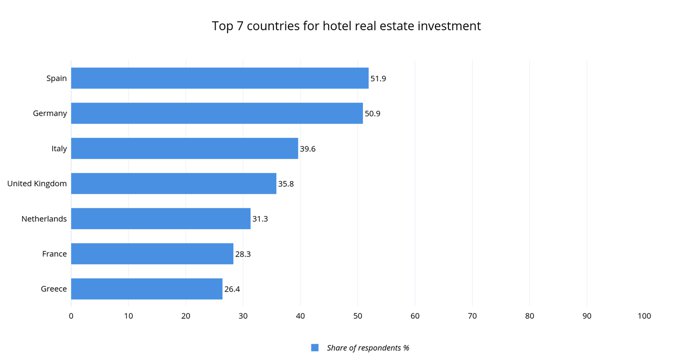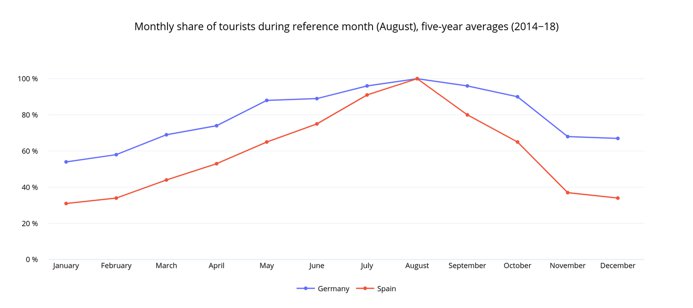Germany vs Spain: Which hotel market is the best bet?

The world’s travel and tourism market is developing quickly, which in turn is fuelling demand for hotel services. Europe is the most visited continent and property investments in the region are on the rise, with Spain and Germany the most attractive countries.
Germany's tourism market capacity exceeds Spain’s by more than 1.5 times. The latter’s economy is also weaker and its tourism seasonality is more up and down. On average, Spanish hotels enjoy a higher yield than their German counterparts, but the business risks tend to be higher in southern Europe due to the region’s weaker economy.
Predicting demand for hotel services in Germany is easier compared to Spain; revenue per available room (RevPAR) in Germany has been growing steadily for the last decade.
It’s also worth noting that in Spain, there’s an increasing number of expensive/upmarket hotels and the competition among these establishments is higher than in Germany.
In 2019, Tranio surveyed more than 200 industry experts as part of the 22nd International Hotel Investment Forum (IHIF) in Germany to analyse the investment climate of European hotels. This article breaks down the market by comparing the results of the survey with new economic indicators in the hotel and tourism industry. The results are a comparison between the investment attractiveness of hotel property in Germany and Spain (as the leading countries in actual volume of hotel property investment in Europe).
1. Global tourism and the hospitality market
From this point on in the report we use the term "tourism and travel market" for the total volume of money spent by holiday/business travellers at home and abroad (directly and indirectly) on transport and accommodation. According to the World Travel & Tourism Council 2013 report, the amount of money spent on tourism worldwide has been growing every year from 2013. The average annual growth between 2013 and 2018 was 4%, while the total turnover hit $5.7T. However, taking into account the indirect turnover, government programmes, capital investments, and goods imported for tourism, the contribution of the tourism industry to the global GDP reached $8.8T during the same period. Europe’s tourism industry grew by 3.1% in 2018.
2. Hotel industry investment climate
Investment in European hotel property is also on the rise. The tourism and travel market is the driver for the development of the global hotel industry. According to JLL, hotel property investment in Europe, the Middle East, Africa (EMEA), America, Asia, and Oceania is increasing. From 2018, the total hotel real estate investment volume in these regions reached $67.7B. The volume expected at the end of 2019 is $67.2B – this potentially lower figure is linked to political instability in countries like the UK, France, and Italy.
3. European tourism and hotel property market
According to the World Tourism Organisation’s 2019 report, in 2018 Europe accounted for more than half of all international trips and almost 40% of money spent on tourism globally. Europe is the most visited region in the world.
Investment in European real estate is growing. According to CBRE’s report, between June 2018 and June 2019, the volume of investment in European hotel real estate grew by 5.3% to €24.3B against the same period 12 months before. The UK (€6.3B), Spain (€4.3B), and Germany (€3.6B) were the top three ranked countries for investment volume during the same period.
Spain and Germany also lead the way when it comes to the investment attractiveness of hotel properties, according to the results of Tranio's survey. Italy ranks third and the UK fourth.

4. Comparative analysis of tourism and hotel industries in Germany and Spain
Germany and Spain are way out in front in both the volume of hotel property investment and business attractiveness, according to the surveyed hotel market experts. Although the UK is the leader in the volume of actual hotel property investment, Brexit is taking its toll and the country only ranks fourth in Tranio’s survey. Therefore, the comparative analysis only features Germany and Spain.
Germany | Spain | |
Demand | ||
T&T GDP 2018 (Tourism market capacity), $ B. | 345 | 211 |
Tourism seasonality | Medium | High |
Average hotel property yield rate (2019) | 3.75% | 4.75% |
Demand predictability (via the country's GDP) | High | Low |
Revenue Per Available Room (RevPAR), Compound Annual Growth Rate (CAGR) (2009–2018), % | 3.7% | 6.6%** |
Hotel property distribution by category, % (economy/mid-range/premium/luxury) * | 22/28/45/5 | 7/34/54/5 |
Competition | ||
Total number of hotels in country, 2018 | 20,029 | 7,401 |
Total hotel room capacity in country, 2018 | 827,861 | 695,949 |
Total number of tourists/travellers staying in hotels, M, 2018. | 146 | 105 |
The number of tourists and travellers per hotel room in the country (per annum), 2018 | 176 | 151 |
The share of hotels owned by big chains, 2018 | 11% | 34% |
Germany's tourism market capacity exceeds that of Spain by more than 1.5 times, which suggests that the potential for hotel business development in Germany is higher. The dynamics of business development in Germany during the initial years may be more favourable than in Spain.
Tourism seasonality in Spain is more expressed compared with Germany. During the low season in Spain, the tourist flow can dip to just 31% of the peak flow, whereas in Germany it usually only drops to around 54% of the peak value. These figures suggest that in Germany, hotel business revenue can be more stable during the annual cycle, when a cash flow gap is more likely to appear.

According to the CBRE 2019 report, the average yield rate of Spanish hotels exceeds that of German hotels, but the business risks are also higher in Spain. Higher hotel property yields in Spain may also be linked with a demand and supply shift towards more expensive hotels.
The predictability of demand for hotel services in Germany is higher than in Spain. Christie & Co’s 2018 report showed that the ratio between Germany's GDP dynamics and the dynamics of the RevPAR was high at 0.95. This figure is markedly lower for Spain — below 0.7 — and is not significant because only figures above 0.9 are considered worthy. Therefore, it is possible to make an accurate prediction of the RevPAR index when collecting data for a German GDP forecast; in Germany, the hotel business may be more predictable than in Spain.
RevPAR in Germany has been growing steadily for the last decade. Such dynamics possibly suggest an opportunity to create a stable hotel business in Germany, as evidenced by the steady RevPAR growth in recent years. However, in Spain, the growth of this figure almost doubles that for Germany.
In Spain, there is a growing number of more expensive/upscale hotels. However, this only applies to chain hotels. This situation may be linked to the nature of the tourist flow. Unlike Germany, Spain attracts a higher share of international tourists (66% of all hotel stays in the country against 24% in Germany, according to Eurostat, 2018), who tend to be more demanding when it comes to the standard of hotels. In Germany, cheaper hotels are in demand – this may suggest a lower volume of initial investment is required to open a competitive hotel in Germany compared to Spain
The competition among hotels in Spain looks fiercer than in Germany. This primarily refers to the share of branded hotels (34%) in the country. They are able to attract clients more easily thanks to their reputation. By taking property demand seasonality in Spain into account, it is possible to conclude that during the off-season (when there are less tourists) competition among Spanish hotels really heats up. Another example of strong competition for tourists in Spain compared to Germany is a lower number of guests per hotel room per annum (the value listed in Table 1).
We will send you a content digest not more than once a week
